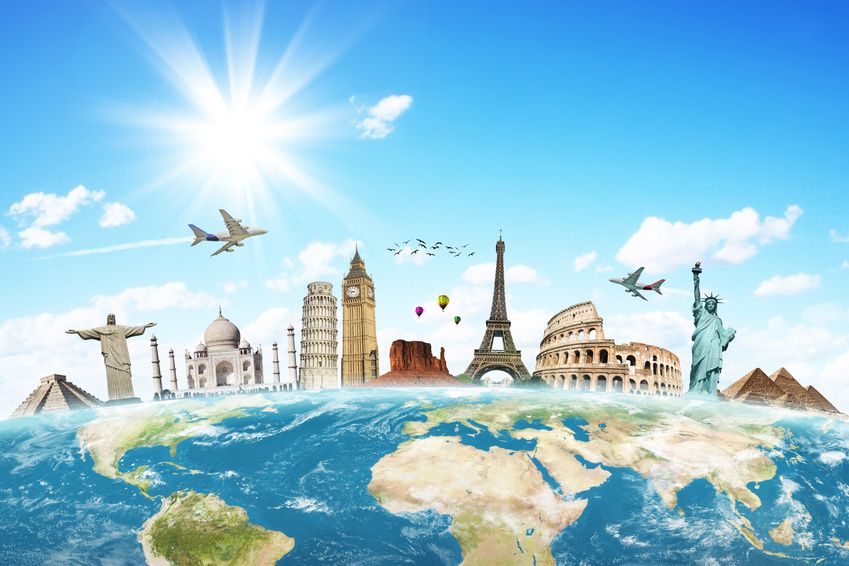Travel and mental health: What effect does Covid have?

When life gives you a giant pandemic, make … a vacation. Or, at least that might have been the case, if travel hadn’t been so badly thwarted the past 18 months. It’s a bit of a catch-22, isn’t it? The need to get away is never greater than when you’re not allowed to go anywhere, and yet - although things are thankfully heading in the right direction - we’re still not quite there. So, it leaves us in a bit of a quandary: Is it worth making the trip even with all the tests, increased costs, potential quarantine and overall concern?
Psychological benefits of travel
Let’s go back to a life pre-Covid, when we - probably - took the ability to travel as and when we wanted for granted. A vacation was more than just a way to top up a tan, wasn’t it? It was - is - vital for our overall wellbeing. And here’s why:
- It reduces stress. Hardly a shocker, really. A vacation - by definition - doesn’t mean you’re even going anywhere; it just means you’re taking a break, and when is that not hugely beneficial for your mental health? Swapping the 9-5 for a change of scenery is the perfect way to reset and let your mind switch off from all its daily pressures, leading to lower cortisol levels, making you feel more calm and content. Not that every vacation necessarily needs to be accompanied by scorching temperatures, but many are, and sunshine is a great mood-booster, thanks to vitamin D and an increase in the brain’s happy hormone, serotonin. Research on the benefits of travel is vast, with one 2013 study finding more than 80% of surveyed Americans noticed significant drops in stress after just a day or two of being on vacation. However, according to psychotherapist and author André Randall, the benefits can begin as soon as you’re on the “plane, car or train journey” as it’s a “great time to clear the mind.”
- It makes you happier. Traveling - no matter where you go - is one of the most natural mood-boosters out there. (We mean, duh!). What’s more, it’s even been linked to lower levels of depression, with a late 1990s study finding that women who traveled at least twice a year were less likely to suffer from mood disorders.
- It can boost confidence and self-esteem. Travel is not all sun loungers and spa days; it can also mean navigating crowds, struggling with language barriers and battling with a new currency - all great skills that will give you a real boost by the end of your trip! Put it like this: If you’ve successfully managed to backpack around a different country without knowing the language, your next job interview or big board meeting will probably seem like a walk in the park.
- It can help improve sleep patterns. It’s no secret that banking those zzzs is integral to mental health, and it’s far easier to make sure you’re getting the minimum recommendation of at least seven hours a night while away from your daily distractions. (Siesta, anyone?)
- It’s great for relationships. Maslow’s hierarchy of needs identifies love and belonging as a key psychological need, and sharing travel adventures with those close to you is a sure-fire way to achieve this. But that’s not all: Traveling is also great for forming new connections with new people - something we’re craving more than ever right now. If social distancing has taught us anything, it’s just how important it is for us to be around others.
- It improves mental power. Allowing your mind to rest while on vacation means a more productive and focused brain when you get back!
- It’s great for physical health, too. Exercise is known to be beneficial for mental health, and travel offers ample opportunity to get those steps in, whether it’s biking around a new city, swimming in the sea or scaling a mountain (obviously not taking the three scoops of gelato into account or anything.). Did you know you can rack up as many as 20,000 steps at Disneyland? (No, we’re not taking the Mickey!) #sorrynotsorry
- It enhances creativity and productivity. People who travel more are exposed to new cultures, new people, foreign languages and different types of food and - as such - are likely to come up with more diverse ideas. This is thanks to an increase in the brain’s neuroplasticity (how the brain adapts and rewires itself, awakening new areas.). In short, it offers a new perspective, and when’s that ever a bad thing? “This is particularly important at this time after a period of lockdowns and restricted movement when it is helpful to step outside the normal routine and surroundings and to breathe the air of another place,” André says. What’s more, time away from work can increase your energy and productivity, according to a Harvard Business Review study.
- It gives you something to look forward to. Even if you can’t actually go away now, there’s nothing wrong with planning the trip of a lifetime, is there? Several studies have confirmed that the anticipation of booking a vacation has far greater benefits than buying material goods and that people are at their happiest when they have a vacation planned. Mental health benefits kicking in before you’ve even checked in? Who’d have thought, hey?
Planning during a pandemic
Traveling can, however, be a cause of stress for some - even without a global pandemic to contend with. As such, we have to ask: Is it still worth it?
It would be irresponsible to suggest that everyone pack up a bag and jump on the next plane - not least because it is - currently - not that simple. As Ray Sadoun, a London-based mental health specialist, says, “you have to worry about vaccinations, PCR tests and countries changing from green to amber to red with little notice.”
Everyone is different and - therefore - will have a different mental constitution when it comes to whether or not they can hack an actual vacation right now. Not to mention that for some of us with family abroad that we haven’t seen for 18 months, it’s less choice and more necessity. But here are some general tips to get the most out of the mental health benefits, even with Covid still in the picture.
- Day trips. There is still a lot of fun to be had - even in your own city - and activities like hiking, skiing and biking in scenic areas can do wonders for your overall wellbeing. “Fortunately, we can go on holiday without traveling abroad” as “staycations have become much more popular,” Ray says. And this is certainly something Avis Car Rentals have seen this summer, too, with the vast majority of UK families doing just that, driving an average of 87 miles per day trip and planning 4-5 throughout the holidays at a cost of around $150 each. “Whether you decide to head to Ibiza or go on a day out in your hometown, a bit of travel will be good for your soul,” Ray says.
- Plan, plan, plan! As mentioned above, just the anticipation of a vacation is great for your mental health, so get stuck into the planning stage, even if you’re still not entirely sure when you’ll make it. As travel expert Rick Steves is reported to have said in the New York Times, “this virus can stop our travel plans but it cannot stop our travel dreams.”
Where will you head to next? Check out our top day trips here.



